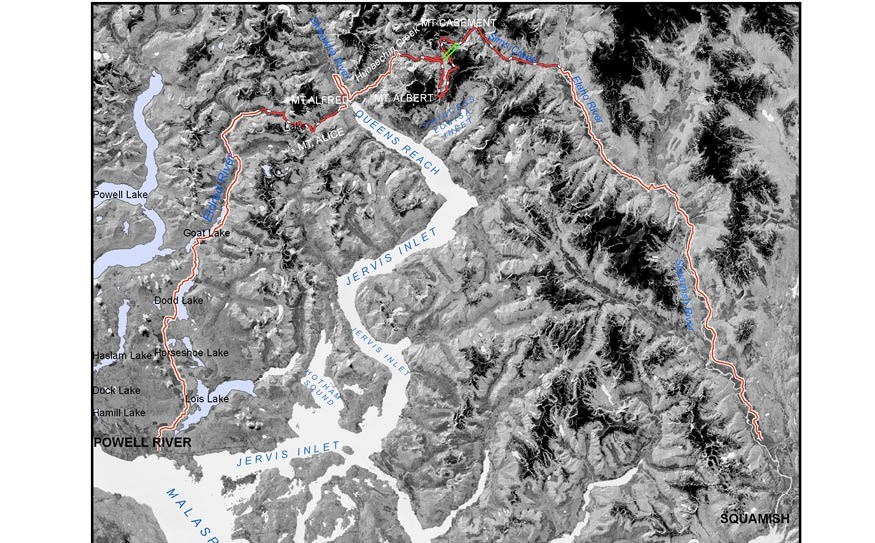A 42-year-old economic development dream is getting new energy.
Logging roads built decades ago still don't connect today and a group of Powell River residents are currently lobbying to connect the roads.
In 1970, The Powell River Chamber of Commerce tasked a group of young guys with exploring the mountains between the coastal community and Squamish as part of an initiative to blaze a trail along a route that could potentially connect the two communities by road at some point in the future. Logging companies had built roads on either side but the roads didn't connect in an area that is 1,200 metres (3,900 feet) above sea level.
On Aug. 2 that year a group of 27 adventure seekers set out on what they called the Dogwood Trek.
Writer John A. Way was a member of the group and after the trip he published an account of the adventure, complete with pictures.
"If it comes to pass that a road is built to connect Squamish and Powell River... there would be many benefits, particularly in commerce and tourism," wrote Way.
The proposed route between Squamish and Powell River calls for upgrades to the logging roads in the Elaho River valley on the eastern end of the route and upgrades to existing logging roads in the Jervis Inlet area on the western end.
The group currently pushing for the creation of this overland route is called the Third Crossing Society and it has more than 100 members. So far the society has created a website and a video showing a map of the proposed route over the mountains. The website was updated this fall and the video outlining the route on a virtual map has since been removed from the website.
According to the society's president, 30 kilometres of new road would have to be built and 170 kilometres of existing logging roads would need to be upgraded.
"If feasibility is established, the second objective of the society is to promote the building of the road," society president Tom Wheeler wrote on the group's website. "Our research to date suggests that such a roadway appears feasible."
The group has little to no funding faced with an initial $100,000 hurdle to complete surveying work to establish detailed route information.
Wheeler said in an interview from Powell River that a group of people led by Powell River-Sunshine Coast Regional District (PRSCRD) chair Colin Palmer plan to swing through the Sea to Sky corridor to meet with municipal and regional district leaders to share the road vision.
Palmer confirmed that on Oct. 22 a delegation of Third Crossing advocates will travel to the Squamish-Lillooet Regional District (SLRD) meeting to present the concept to SLRD representatives and request support in principle for the concept. The foundation for the meeting, said Palmer, was laid during the Union of BC Municipalities convention in Victoria last month.
"Our regional board has received the concept in principle," said Palmer from his office in Powell River.
Palmer has been working on the concept of building the road since 2003. The conversation started to get serious in 2005 but Palmer said the provincial government's highway focus at that time was shifting to the upgrade that was needed for the Sea to Sky Highway in time for the Olympic Winter Games in 2010. After that he said other highway funding priorities came up for the provincial government.
"You just couldn't convince them to come up with any money," said Palmer.
According to Palmer, the society is looking to create chapters in other communities and each chapter of the society would be made up of people who support the concept.
The group has written responses to some of the most common concerns related to the road idea. On the issue of the steep terrain along the proposed route, Wheeler has pointed out that research indicated only 3.8 per cent, or 7.6km of the possible route, has a gradient of more than five per cent and the route has no gradients over 10 per cent. For those who have said the route will be expensive to keep clear of snow, the society argues snow clearing wouldn't be any more expensive than any other mountain highway in the province.
Maintenance costs and economic development issues aside, Way in his account of the trek in 1970, called the mountain pass between Powell River and Squamish a place that offers fantastic views.




